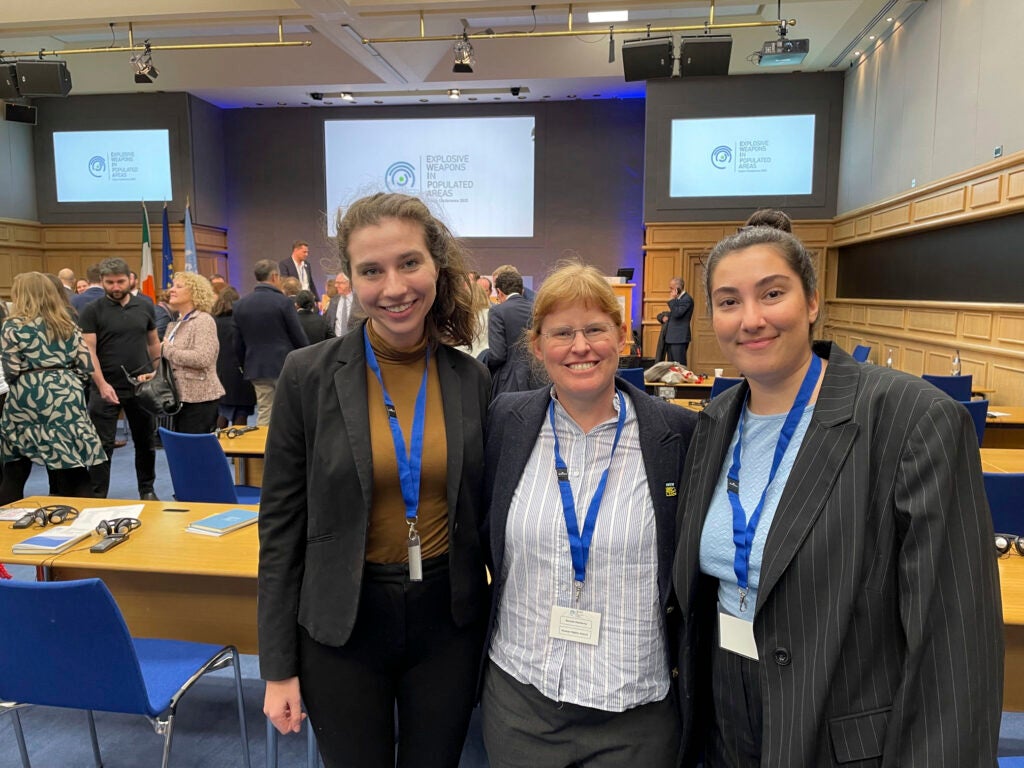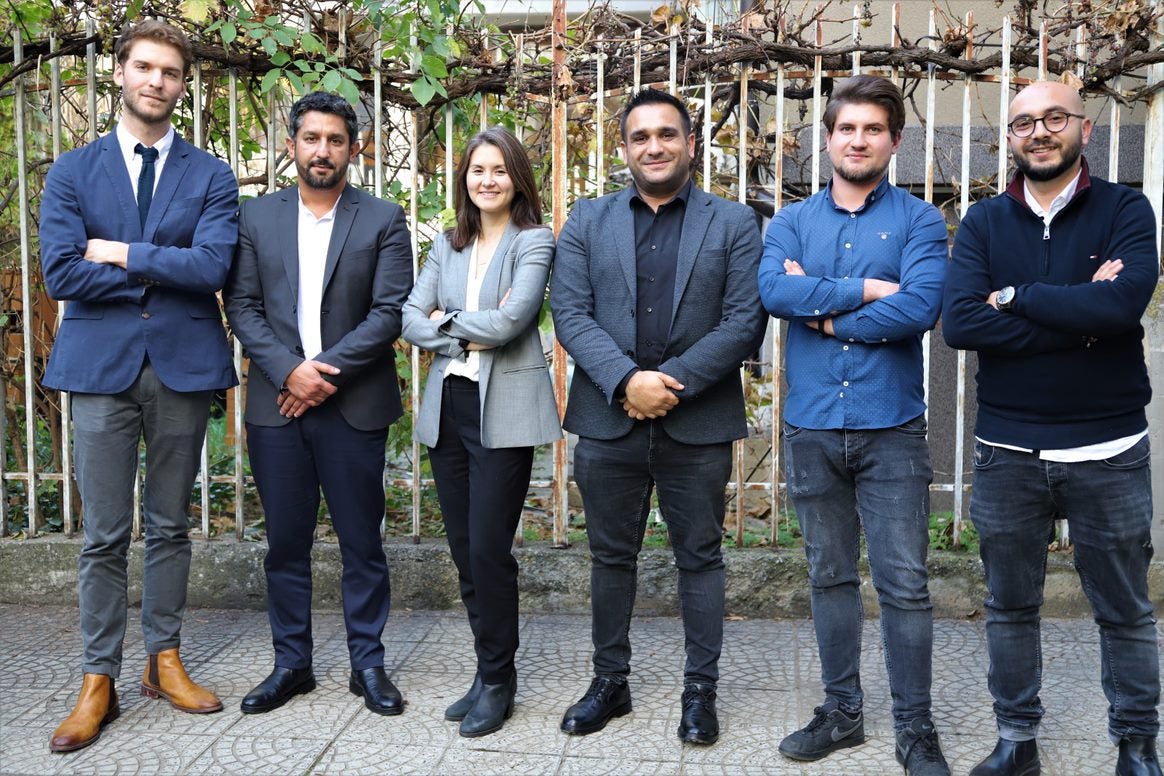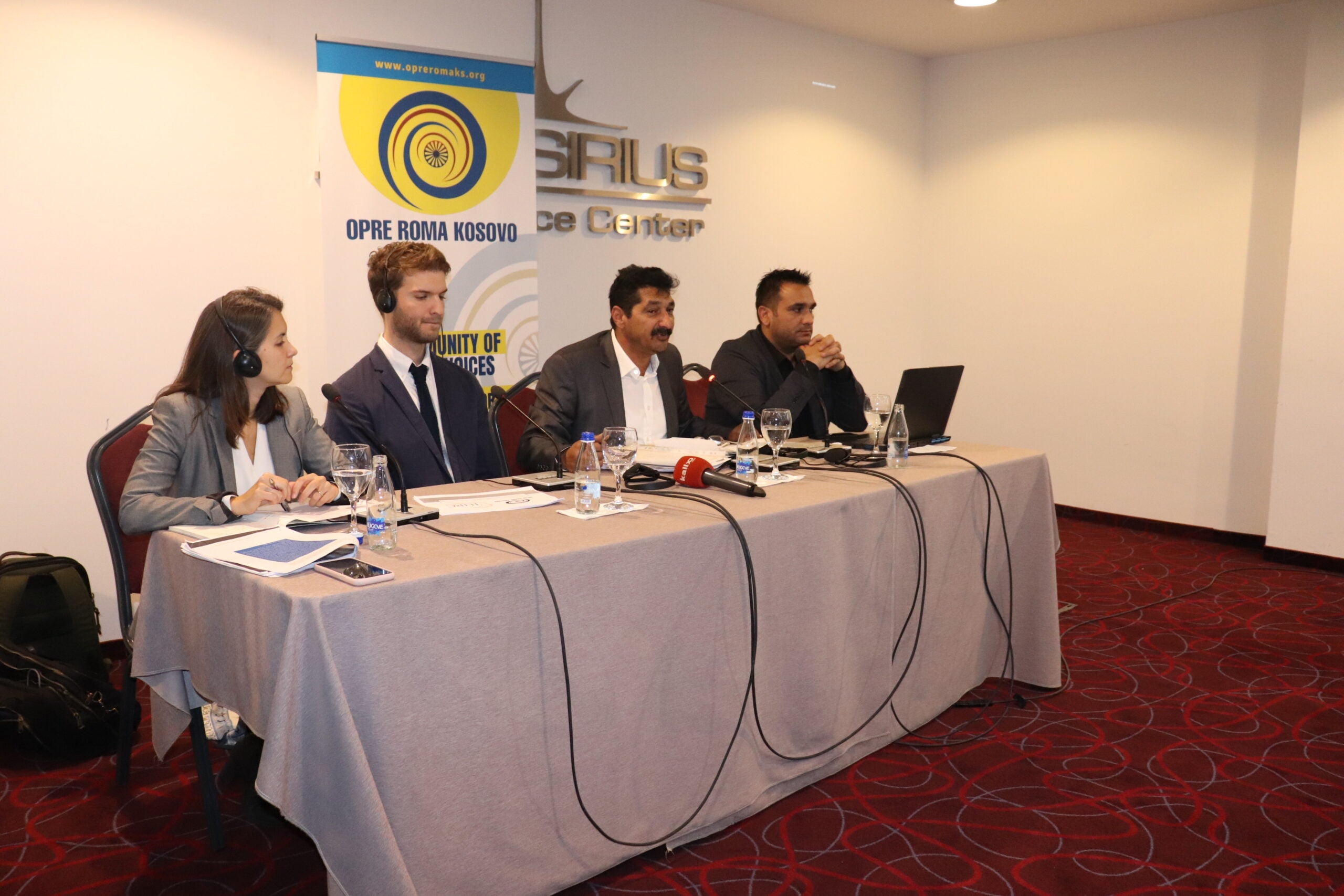By Olivia Klein
This November, the International Human Rights Clinic (IHRC) resumed in-semester international travel for the first time since the outbreak of COVID-19 with students and clinicians heading to Dublin, Ireland and Pristina and Mitrovica, Kosovo.
Dublin, Ireland
With senior clinical instructor Bonnie Docherty, Madeleine Cavanagh ‘23 and Gayane Matevosyan ‘23 travelled to Dublin for the November 18 signing ceremony of the Political Declaration on Strengthening the Protection of Civilians from the Humanitarian Consequences arising from the Use of Explosive Weapons in Populated Areas (EWIPA) at Dublin Castle.

The Clinic has advocated for the Declaration for about a decade, and during the signing ceremony, 82 countries formally endorsed the instrument to better protect civilians from the bombing and shelling of cities and towns.
This semester the Clinic released a report, co-published with Human Rights Watch, entitled “Safeguarding Civilians,” which interprets the key commitments in the new Political Declaration through a humanitarian lens. For example, the report calls on countries to refrain from using explosive weapons with wide area effects in populated areas and to assist victims of the practice.
The Declaration “is a milestone for efforts to advance humanitarian disarmament and curb human suffering during armed conflict,” writes Docherty in an article for Just Security. This international commitment ushers in a new era wherein “governments, international organizations, and civil society groups now need to focus on universalizing, interpreting, and implementing the document.”
“Having worked with the International Human Rights Clinic on research and advocacy related to the EWIPA Political Declaration for two semesters, it was incredibly gratifying to be able to be present in person in Dublin to celebrate the adoption of this important document,” said Cavanagh. “I especially enjoyed being able to hear from states regarding their varying interpretations of the text – it was a great opportunity to witness the interaction between international law and politics firsthand. Attending the Dublin Conference also allowed me to hear from members of civil society regarding their experiences advocating for the adoption of the Declaration. As someone who anticipates joining civil society after graduation, it was incredibly inspiring to learn about the immense impact that these actors have had on the development of this text.”
“Traveling to Dublin for the signing ceremony of the Political Declaration was an amazing experience because it represented the progress we are making as a society in working towards a humanitarian approach to armed conflict,” reflected Matevosyan. “It was immensely powerful to witness 82 states endorsing commitments that will positively impact so many people moving forward. The signing ceremony was the first step on the journey to adopting lasting meaningful change, and I very much look forward to strong implementation of the commitments that states endorsed in Dublin. I am so grateful to the Clinic and our supervisor, Bonnie, for giving me the opportunity to participate in such a momentous occasion.”
You can read the full report here.
Pristina and Mitrovica, Kosovo
Jake Soria ‘24 travelled to Kosovo with clinical instructor Beatrice Lindstrom for the launch of the Clinic’s co-authored report on the United Nations’ (UN) failure to provide remedies for lead-poisoned Roma communities.

The report, published in collaboration with Opre Roma Kosovo, finds that the UN failed to act upon their own human rights panel’s findings that the UN owed reparations for lead poisoning suffered by Roma communities in UN-managed camps”. According to IHRC’s press release: “In 1999, while serving as de facto government in Kosovo, the UN housed over 600 Roma in camps near toxic slag heaps. The camps remained for over a decade, and the resulting lead poisoning – which produced some of the highest levels of lead ever recorded in humans – led to the death of multiple camp residents and caused serious ongoing health effects.”
Alongside their partners at Opre Roma Kosovo, Lindstrom and Soria held a public discussion of the report findings in Pristina and traveled to the Roma neighborhood, Roma Mahala in South Mitrovica. During the discussion, Roma victims voiced their ongoing calls for accountability: “We want justice for our children,” was their resounding call to the UN.
For Soria, being in a room with the community impacted so deeply by the matters covered in the report brought a new perspective to the Clinic’s work. “Being in Kosovo allowed me to develop a deeper understanding of the complex issues facing Roma communities impacted by lead poisoning in Kosovo,” Soria said.
“The trip taught me valuable skills in human rights advocacy, including developing an advocacy strategy and meeting with government officials,” he added. “Not only did I learn from Professor Lindstrom, but also our partners at Opre Roma Kosovo. The launch of the Report in Pristina represents the first step in the Clinic’s fight for justice for the lead-poisoned Roma communities in Kosovo. I look forward to continuing to work on this issue with the clinic.”

After returning to the United States, other team members brought the report to New York to raise the issue with UN member states. Clinic students Anna Bower ’23 and Scarlett Park ’24 presented the report’s findings in meetings and urged governments to support justice for the victims.
You can read more about the report in an op-ed by clinical students Bower, Park, and Soria.
Filed in: Clinical Spotlight, Updates
Tags: Class of 2023, Class of 2024, International Human Rights Clinic
Contact Office of Clinical and Pro Bono Programs
Website:
hls.harvard.edu/clinics
Email:
clinical@law.harvard.edu